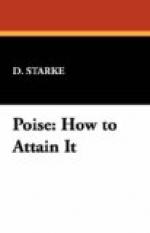At the same time one should keep on repeating these words:
“I am composed. I propose to be composed. I am composed!”
The constant reiteration of these words constitute a species of suggestion, and peace will steal gradually into our souls and will permit us to think quietly, without the risk of becoming entangled in disordered fancies, or, what is far worse, falling a prey to vain and unavailing regrets.
Those who doubt the efficacy of this proceeding can be readily convinced by proving to them the tremendous power of mere words.
Certain of these electrify us. Such words as patriotism, revolt, blood, always produce in us an emotion of enthusiasm or disgust.
Others again are productive of color, and one must admit that the constant repetition of an assurance ultimately leads to the creation of the condition that it pictures to us.
But to make the assertion to oneself, “I am composed,” is not all that is necessary. One must prove to oneself that one is not glossing over the truth.
The readiest means of accomplishing this, which is open to every one who has any regular interests, is to mentally review the words and the actions of the day, and to pass judgment upon them from the point of view of the quality one is striving to attain.
DAILY SELF-EXAMINATION
One should convince oneself as soon as possible of the truth of the fact that sincerity toward oneself is a large factor in attaining that firmness of judgment that must be cultivated by the man who is in search of poise.
In order to reach this condition nothing is more easy than to pass in mental review, every evening, the events that have marked the day that has passed.
In a word, one should strive to relive it, honestly confessing to oneself all the mistakes that have crept into it.
Every unfortunate speech should be recalled. One should formulate fresh replies, that lack of poise did not permit us to make at the time, so that under similar circumstances we may not be again caught at a disadvantage.
The witty name of “doorstep repartee” has been given to these answers which one makes as afterthoughts, with the idea of expressing the embarrassment of the man who can find no arguments until he finds himself beyond the reach of his opponents. It is after one has gone out, when one is on the doorstep, that one suddenly recognizes what one ought to have said, and finds the phrases that one should have used, the exact retort that one might have hurled at one’s antagonist.
The man who has acquired poise should still accustom himself to practise this force of mental gymnastics when making his daily self-examination.
It will strengthen him for future contests by teaching him just how to conduct himself.
He must be always on his guard against one of the obsessions that too often afflict the timid—the mania for extremes.




